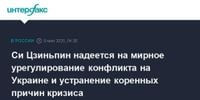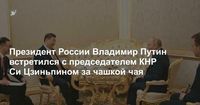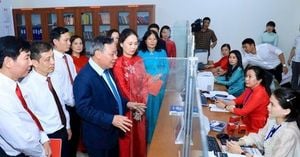On May 8, 2025, Chinese President Xi Jinping and Russian President Vladimir Putin held an informal meeting over tea in Moscow to discuss the ongoing war in Ukraine. This meeting, which took place in the Kremlin, was part of Xi's visit to Russia, coinciding with events commemorating the 80th anniversary of the end of World War II. It marked Xi's eleventh trip to Russia, highlighting the deepening ties between the two nations.
During the meeting, Xi emphasized the need to address the "root causes of the crisis" in Ukraine. He stated, "In connection with the Ukrainian crisis, China supports a comprehensive, all-encompassing, and sustainable global security concept and believes that attention should be paid to the reasonable security concerns of all countries and that the root causes of the crisis should be addressed," as reported by the Chinese Foreign Ministry.
Putin, for his part, expressed Russia's readiness to engage in peace talks without preconditions, hoping to achieve a "fair and lasting peace agreement." The Russian president noted the importance of dialogue in resolving the conflict. This willingness to negotiate comes amidst ongoing tensions, with Ukraine and its allies dismissing Russia's claims about the crisis as unfounded excuses for its military actions.
According to Reuters, Russia often refers to the "root causes" of the conflict, claiming it was compelled to act to prevent Ukraine from joining NATO. However, Ukraine and its Western allies view this narrative as a pretext for the full-scale invasion that began in February 2022.
Following their discussions, Putin and Xi signed a joint statement aimed at further deepening the all-encompassing partnership and strategic cooperation between Russia and China. This agreement encompasses various areas, including politics, security, economic ties, and cultural exchanges. Putin highlighted that around 90 bilateral projects, amounting to approximately $200 billion (176 billion euros), are either in progress or preparation, covering sectors such as industrial production, transport, logistics, agriculture, and mining.
Furthermore, Moscow and Beijing are working towards transitioning their financial transactions to national currencies, a move that could strengthen their economic ties and reduce reliance on Western financial systems. The launch of the Far Eastern pipeline route is also planned for 2027, which would increase Russian gas exports by an additional 10 billion cubic meters.
On the geopolitical front, both leaders agreed on the importance of the United Nations and its Security Council in maintaining international order. They expressed a shared vision of forming a large Eurasian partnership within the framework of the Eurasian Economic Union (EAEU) and China's "One Belt, One Road" initiative. This partnership aims to enhance economic cooperation and regional stability.
Xi's visit and the discussions held with Putin come at a time when both nations are facing external pressures, particularly from the West. China has expressed its desire to collaborate with Russia to safeguard their mutual interests against what they describe as "unilateral actions and intimidation" from other countries.
As Xi remarked during the meeting, "It is important to strengthen political mutual trust and activate strategic interaction between China and Russia, whose relations will become increasingly mature and robust." This sentiment underscores the growing partnership between the two nations, which they hope will foster a climate of mutual benefit and prosperity.
Looking ahead, Putin is scheduled to visit China in September 2025, coinciding with events marking the end of World War II. This visit is anticipated to further solidify the ties between the two countries and potentially lead to more concrete agreements in various sectors.
The backdrop of their discussions was the ongoing conflict in Ukraine, which has had significant implications for global security and international relations. The crisis has drawn in various international actors, complicating the geopolitical landscape. Both leaders appear committed to finding a resolution that addresses the concerns of all parties involved, though the path to peace remains fraught with challenges.
In summary, the informal meeting between Xi Jinping and Vladimir Putin reflects a significant moment in the evolving relationship between China and Russia. Their discussions on the Ukrainian crisis and broader geopolitical issues underscore a shared commitment to strengthening their partnership amidst a changing global order. As both nations navigate these complexities, their cooperation may play a crucial role in shaping the future of international relations.





